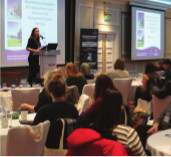

The conference brought together some of the leading experts to present the latest developments in the management of challenging behaviour and social handicap after acquired brain injury (ABI). In addition to an impressive ensemble of speakers, the conference attracted a range of exhibitors and over 100 delegates involved in the care of individuals with ABI. The conference provided an excellent learning environment for delegates to share knowledge and there were plenty of opportunities for questions and discussions, enabling further insights and debates to be aired. The whole event was full of energy and enthusiasm.
Professor Nick Alderman (Clinical Director, Neuropsychological Rehabilitation Services, Elysium Healthcare) commenced proceedings by delivering an authoritative account of the conceptualisation and assessment of neurobehavioural disability. He presented an overview of the St Andrew’s Swansea Neurobehavioural Outcome Scale (SASNOS; sasnos@swansea.ac.uk), covering information related to its initial development, its core features and benefits, as well as information about recent SASNOS developments. With the latter, he explained how ratings of NBD concerning patients in residential rehabilitation programmes reflect the prevalence of behaviours and functional abilities in the context of rehabilitation, acknowledging that we cannot assume that results obtained will be generalisable to other settings. Sometimes ratings on various tools can be comparable with neurologically healthy people and could prompt discharge to a less restrictive environment. However, whilst rehabilitation ideally results in long-lasting change, some improvements require ongoing support which standardised scores in the ‘normal’ range do not indicate by themselves. The risk is that some people may be discharged from services prematurely without the support needed to maintain autonomy. To mitigate this risk, he highlighted how a supplementary SASNOS scoring system1 can be used to recalibrate standard scores to estimate the effect on ratings without support.
Professor Alderman concluded his talk by explaining that the conference programme had been structured to address how social handicap could be minimised in the five major domains of NBD captured by the SASNOS – interpersonal relationships, neuro-cognitive function, inhibition, aggression, and communication.
With the contextual back-drop to the conference set, Dr Giles Yeates (Principal Clinical Psychologist, Community Head Injury Service, Buckinghamshire Healthcare NHS Trust) and Eachelle Khan (Assistant Psychologist) took to the stage next to focus on how we can support interpersonal relationships following ABI. Dr Yeates explained how brain injury represents a simultaneous attack on relationships and self, representing an eroding ripple that passes through all relationships in a survivor’s social network, proceeding over time through closer relationships. He explored the useful- ness of emotionally-focussed couple’s therapy after ABI, the therapeutic working alliance in neurorehabilitation, and emphasised how rehabilitation goals for supporting inter-dependence and connection with others should be a routine priority.
Professor Barbara Wilson OBE (Clinical Neuropsychologist, The Oliver Zangwill Centre and The Raphael Medical Centre) discussed the rehabilitation of everyday cognitive deficits with a particular focus on memory. At the start of her talk she reminded us that rehabilitation is NOT synonymous with recovery OR treatment, and that rehabilitation IS a two way interactive process. In relation to neuropsychological rehabilitation, the main purpose is to enable people to achieve their own optimum level of wellbeing, to reduce the impact of their problems on everyday life, and to help them return to their own most appropriate environments. She outlines a multitude of helpful strategies and rehabilitation approaches. Having published 23 books during her impressive career, I suspect that many who attended will have had a few of her books on our Christmas 2017 ‘Wish Lists’!
The next speaker was Professor Andrew Worthington (Clinical Director, Headwise) who presented ‘An Uninhibited Guide to Disinhibition’ – a title that had grabbed many delegates’ interest for months prior to the conference. Never one to disappoint, he started “as disinhibited as he dare!” and continued to present an informative guide on the assessment and management of disinhibition. He concluded with a look towards managing disinhibition in the next 10-20 years, providing delegates with much food for thought.
After lunch, Professor Alderman returned to discuss neurobehavioural rehabilitation approaches to the management of post-ABI aggressive behaviour disorders. After opening with a game of ‘Bruce Forsyth’s Play Your Cards Right’ to outline the prevalence of aggression in neurorehabilitation services, he proceeded to explore neurobehavioural rehabilitation in practice whilst emphasising the importance of the transdisciplinary team. With the focus on multicomponent interventions to manage post-ABI aggression, delegates received a whole host of helpful suggestions and approaches for future consideration.
Drawing towards the end of the conference, Dr Jennifer Brooks (Consultant Clinical Psychologist, Elysium Healthcare) concentrated on the rehabilitation of the neurobehavioural manifestations of communications disorders. With a particular focus on tangentiality, she proceeded to outline the impact of cognitive communication disorders and detailed strategies to reduce tangents. Owing to its practical significance and usefulness, the talk was very well received by delegates.
The final speaker of the conference was Dr Zoe Fisher (Clinical Psychologist in Neuropsychology, Community Brain Injury Team, Abertawe Bro Morgannwg University Health Board) who presented an incredibly interesting and inspiring overview of her team’s revised approach to community based neurorehabilitation. She explained how their programmes make use of co-production, positive psychology and task shifting principles to improve resilience, wellbeing and facilitate community and social integration.
1. Alderman N, Williams C & Wood R. (2017). When normal scores don’t equate to independence: Recalibrating ratings of neurobehavioural disability from the ‘St Andrew’s – Swansea Neurobehavioural Outcome Scale’ to reflect context-dependent support. Brain Injury, 1-12. doi: 10.1080/02699052.2017.1406989.
Save the Date: Next year’s conference will take place on 26 November 2018, Swansea UK.